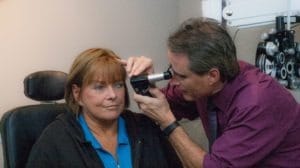Effective Treatment for Serious Eye Diseases
Did you know your vision changes every year? While transformations in eyesight are mostly minute and usually nothing to worry about, serious eye issues and diseases can begin to develop slowly through these small shifts.
Unfortunately, you can’t recognize the signs for some of the most serious eye conditions until the damage is already done. That’s why early testing and treatment are so vital.
Through an annual healthy eye exam – regardless of whether you wear glasses or contacts – your eyesight will be thoroughly assessed and the onset of an eye disease can be detected early. This will save your eyesight.
“From beginning to end, everyone was very friendly and helpful. It was a very welcoming atmosphere. Dr. Wineland was very thorough in his examination and took the time to explain and educate me on my treatment. He is very personable and knowledgeable.”
Emergency Eye Care & Treatment for Temporary Eye Problems
Sustaining an eye injury or experiencing a sudden vision issue or infection should be treated as an emergency by contacting iCare Vision immediately.
Keep in mind that because temporary eye problems and eye emergencies can happen unexpectedly and very suddenly, eye emergencies are better treated by an eye doctor than by urgent care or the emergency room (ER).
For eye injuries, infections, or foreign bodies in an eye(s), the eye experts at iCare Vision are on-call 24/7.
Contact us for emergency eye care or further learn what you need to know about eye emergencies:
24-Hour Emergency Eye Care
Call 888-393-3911
Learn More
“Dr. Wineland worked me in after hours and the staff stayed late to make sure everything was OK when I had an emergency. They were all so gracious and kind even though I am sure they were ready to go home! They really go above and beyond to make sure patients are taken care of.”
Eye Diseases Detected, Monitored and Treated
The staff at iCare Vision Center has detected, monitored and treated eye diseases for over 30 years.
What eye condition are you contending with? Trust us to help you with any issue you’re experiencing. We diagnose and treat the following conditions and diseases:
- Allergies
- Cancerous tumors
- Cataracts
- Diabetic retinopathy
- Dry eyes and tearing
- Glaucoma
- Macular degeneration
Allergies
Bothersome eye irritations, such as itchy, red, watery eyes, demand relief and fast. To understand the causes and symptoms of eye allergies, and to learn about eye allergy treatment, read our Eye Allergy: What You Need to Know for Itchy Eye Relief page:
Cataracts
A cloudy area of the normally transparent lens of the eye, a cataract causes vision to become blurry or dim without eye pain. It can also cause colors and lights to grow dull through the eyes. To learn about prevention, symptoms, and treatments for cataracts, read our Cataracts: What You Need to Know page:
Diabetic Retinopathy
Diabetic retinopathy is a serious eye disease caused by diabetes and is a leading cause of vision impairment and blindness. Get the facts on diabetic eye disease symptoms, prevention, and diabetic retinopathy treatment:
Dry Eyes and Tearing
Irritated eyes that sting and burn red are usually suffering from dryness, but consistently tired, painful eyes don’t have to be a reality. Learn about dry eyes, why a dry eye problem can sometimes cause watery eyes, and the treatment that is available for both:
Glaucoma
Glaucoma, a disease that damages the optic nerve and causes it to slowly die over time, is the silent thief of sight. Learn about the disease, including glaucoma symptoms, prevention, treatment, and glaucoma tests:
Macular Degeneration
Macular degeneration is a common eye condition that deteriorates the macula. It is an incurable eye disease, but you can reduce your risk with early detection. Learn about the disease, including macular degeneration causes, symptoms, types, stages, and much more:
FAQs About Disease Treatment Appointments
You’ll Never Regret Preventive Vision Care
Regular eye checkups will catch many vision problems before they’ve hindered your eyesight.
Our doctors will walk you through a discussion of nutrition, vitamin supplements, exercise, and protection glasses that can help reduce, prevent, or limit most eye diseases.
Schedule your next vision appointment to learn how to take more homeopathic, or natural, care with your eyes.
“My experience was very positive. Dr. Wineland was careful to listen to any questions I had and was thorough with an explanation that helped me understand what my issues are and how to take care of them. I appreciate how kind the staff is and how interested they are in me as an individual.”

